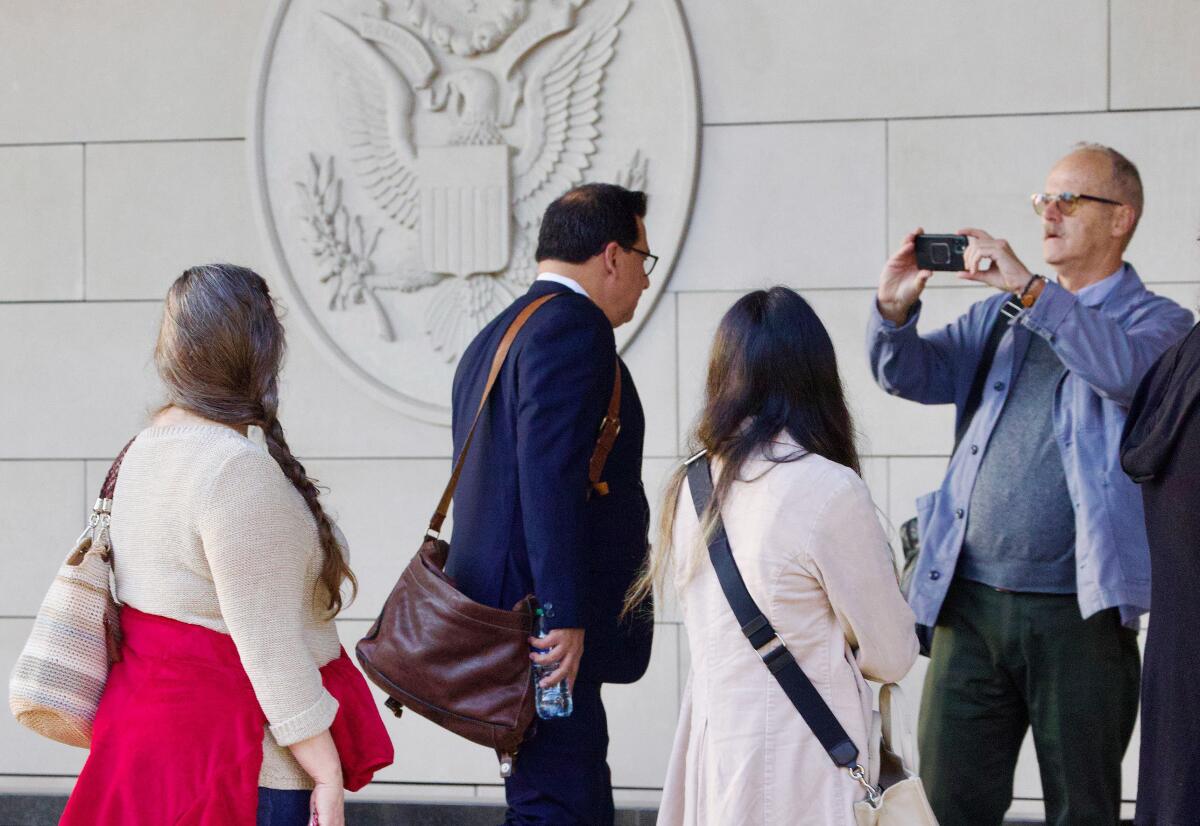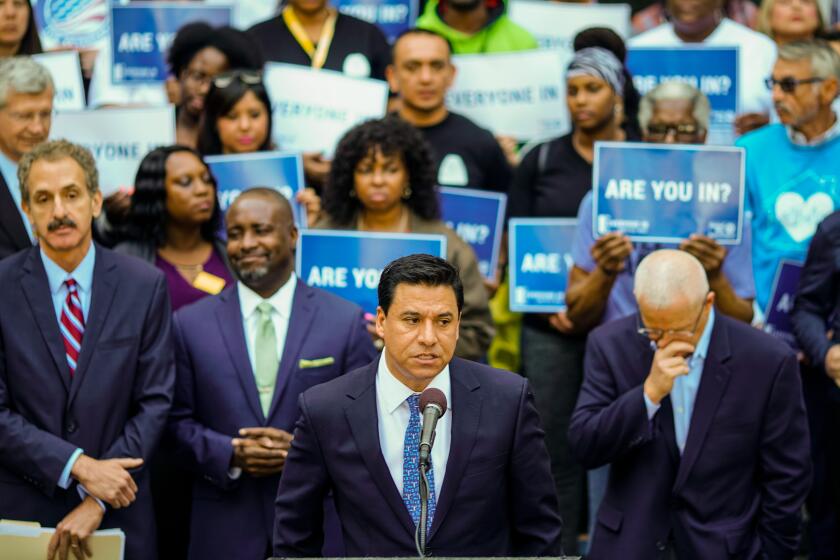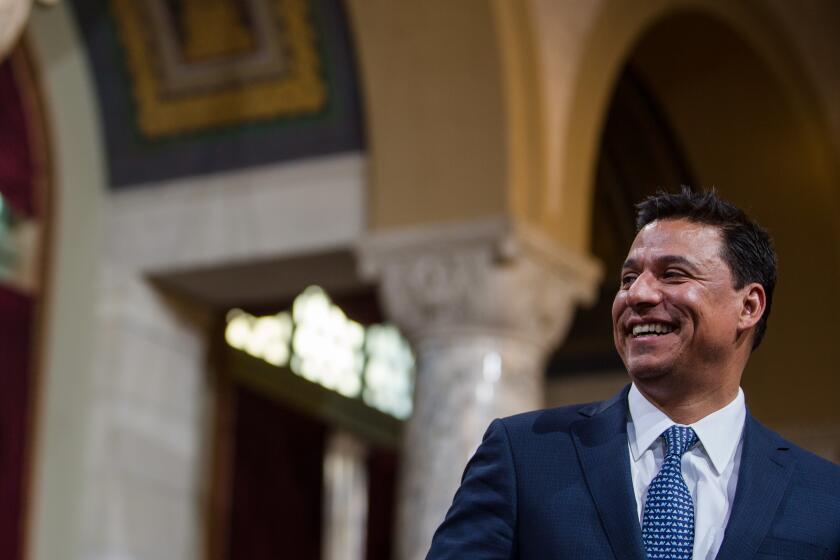Column: Jose Huizar was our rancho’s American dream. Now, he’s headed to prison for 13 years

As he exited the federal courthouse elevator on the way to his sentencing hearing, Jose Huizar was relaxed enough to joke with his lawyers.
The ex-Los Angeles city councilmember would soon find out how much prison time he would serve after pleading guilty last year to racketeering and tax evasion.
Walking down the hall in black glasses and a blue suit and toting a brown satchel, he spotted me. I’ve written columns trashing him for not only disgracing his position but for embarrassing Latinos. He could have scowled, yelled or simply ignored me.
Instead, the Eastside politico offered me a saludo — a greeting, steeped in our rural Mexico roots, reserved for people who command respect.
These native sons boast of rags-to-riches stories while amassing power that lets them enjoy bespoke suits, fancy dinners, campaign donations and other luxuries.
“How’s it going, brother?” he said with a smile as we shook hands and headed to the courtroom together. I asked how he was feeling. He looked as puckish as Alfred E. Neuman as he shrugged his shoulders and put out his hands.
His public defenders, youthful-looking enough to be fresh out of law school, tried to whisk him away, but he wanted to catch up.
“I was in your rancho recently,” he said — El Cargadero, the village in the mountains of Jerez, Zacatecas, where my mom was born, next to Huizar’s birthplace of Los Morales.
In late October, Huizar traveled back to the rancho after U.S. District Court Judge John F. Walter allowed him to “attend religious ceremonies [in Zacatecas] that are important to his Catholic faith.”
In Spanish, I asked if he had attended the Oct. 24 feast day of St. Raphael Archangel, the patron saint of El Cargadero, marked with processions and parties that draw thousands from around Jerez and the U.S. diaspora. Huizar grinned again and went into the courtroom without saying anything else.
You’d think we were cousins catching up at a family party. In a way, we were.
His parents knew my parents. My older cousins know his brothers. He and his family spent summers picking strawberries in the same Orange County fields as my mami and aunts. We followed his ascendancy with pride — Boyle Heights to Berkeley, Princeton to UCLA Law, the L.A. Unified school board to City Hall. At family parties where we caught up on who had done good and who had done bad, my cousins told their children that they too could be like Huizar.
He wasn’t just the American dream. He was our American dream. He represented a zenith for people from Zacatecas, who in Southern California number nearly half a million. Tens of thousands of those are jerezanos, who live mostly in Anaheim, the San Fernando Valley and the Eastside.
When Huizar was arrested in 2020, I not only shook my head in disgust, I sighed in profound disappointment. Prosecutors alleged that Huizar monetized his government position for years, securing more than $1.5 million in cash bribes, gambling chips, luxury hotel stays, political contributions, prostitute services, expensive meals and other financial benefits from developers with projects in his downtown district.
Our elders, meanwhile, cried conspiracy.
I almost brought my dad to the sentencing so he could spot anyone from the rancho. More than 50 people had written letters of support for Huizar — his mother, his children, childhood friends and folks from Jerez. But few, if any, were in attendance. Huizar would answer for his crimes alone.
After prosecutors argued for 13 years in prison, and Huizar’s attorneys argued for nine, Walter spoke. Huizar was loved by his family and even his constituents, the judge said, and his rags-to-riches story was worthy of praise.
But Walter’s sympathy soon turned to anger. He blasted Huizar in a didactic monotone for “selling out his constituents,” an “unusually pervasive and rampant pattern of misconduct” that was in “a league of his own,” for showing “little remorse” and for making people distrust public officials.
Huizar, 55, arched his eyebrows and pursed his lips as Walter let him have it. He spoke only briefly to “reiterate” the apology letter he had submitted to the court the day before.
I nodded along as Walter continued. When Walter said, “It’s difficult to understand why he decided to throw it all away,” any empathy I had for Huizar vanished, despite our shared background.
Our parents bought homes, became U.S. citizens and raised children — my generation — who became teachers, professors, white-collar professionals or blue-collar entrepreneurs. Some of us are famous — jerezanos of note include cartoonist Lalo Alcaraz, twice a Pulitzer Prize finalist; Chicana novelist Helena Maria Viramontes; Maywood councilmember Heber Marquez; and actor Jessica Alba, who’s my third cousin once removed and the descendant of civil rights pioneers in Pomona.
So many jerezanos became success stories without ripping off the public. Why couldn’t Huizar?
Walter gave him the 13 years prosecutors had requested, also ordering him to pay nearly $444,000 in restitution to the city of Los Angeles and nearly $39,000 to the Internal Revenue Service. He must surrender to federal authorities on April 30.
The judge said a substantial prison sentence would recognize the harm done by the former councilmember to his constituents, the city and democracy itself.
Afterward, reporters gathered outside the courtroom. He ignored them all ... except me. He gave me a saludo once again, this time with a fist bump and a smile no less radiant than the one two hours earlier.
I asked again how he felt.
“You know I can’t talk, brother,” Huizar replied. “But when it’s the appropriate time ...” He trailed off as people swarmed him on the way to the elevator.
“Did the Santo Niño de Atocha listen to your prayers?” I replied — a reference to the patron saint of Zacatecas, an image of which Huizar had posted on Instagram hours before federal agents arrested him at his Boyle Heights home. Afterward, zacatecanos from here to the motherland ridiculed him for hiding behind Mexican baby Jesus.
His smile this time was incredulous — as if he couldn’t believe I would go there.
He entered an elevator with his legal team. Court security guards shoved my colleague Dakota Smith back into the hall. Reporters and protesters shot questions and insults at him.
Huizar, however, was listening only to me.
“¿Qué le dices a los de Jerez? ¿Cuál es tu mensaje a tus paisanos?” I yelled.
What do you say to those from Jerez? What’s your message to your countrymen?
This time, Huizar laughed. His smile got so wide that I thought it was going to prop open the doors that closed as he rode down to the rest of his life.













